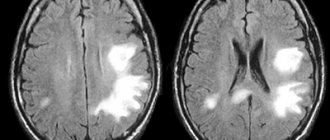When talking about the phenomenon of amnesia, it is often called a disease. If we consider this phenomenon more broadly, we can come to the conclusion: in fact, amnesia is only a symptom of another existing disease - neurological or psychiatric.
Amnesia is the general or partial inability of a person to remember events, both long ago and recently. This phenomenon occurs as a result of a disruption in the process of memorizing, reproducing and storing information.
The disorder is diagnosed in both older and younger people. In the first case, it can be explained by natural degenerative processes in the brain, which are age-related. In the second case, the causes of amnesia can be severe head injuries, alcohol abuse, intoxication and some other factors.
In humans, amnesia can manifest itself in several forms, depending on which the predominance of certain symptoms is observed.
People suffering from memory disorders usually experience severe headaches, are unable to navigate space and time, and cannot remember important data and significant events in their lives.
The clinical picture of this condition is also characterized by anxiety and depression. Amnesia may have a progressive course, but the possibility of its spontaneous occurrence cannot be excluded.
Why does it take away memory?
The roots of amnesia lie in processes associated with pathological changes in brain structures.
Memory impairment in older people, as mentioned earlier, is observed as a result of the natural aging of the body and the slowdown in the functioning of all its organs and systems. In some cases, amnesia in old age occurs due to Alzheimer's disease. This disease is characterized by the death of individual neurons, which leads to the development of dementia.
At an earlier age, the development of amnesia can be caused either by mechanical damage to structures and areas of the brain, or by psychological disorders.
Memory loss is caused by:
- Parkinson's disease;
- Alzheimer's disease;
- brain tumor;
- concussion;
- mechanical damage to the brain and its structures;
- cerebrovascular disorders;
- cerebrovascular accident;
- epilepsy;
- dyslexia (impaired reading ability, in most cases caused by genetic disorders or damage to brain structures);
- depressive states;
- taking certain medications or drugs;
- alcohol abuse;
- previous stroke;
- HIV;
- meningitis;
- intoxication of the body;
- lack of nutrients as a result of an unbalanced diet;
- suffered mental trauma, emotional shock.
All the described factors lead to disruption of the anatomical structures that are responsible for the functioning of memory, namely, memorization, perception, and recording of received information. Against this background, amnesia develops.
Possible causes of this type of memory loss
Anterograde amnesia has risk factors that contribute to the development of the disease:
- advanced age;
- received TBI;
- infectious processes;
- mental disorders.
The main causes of memory loss of this type:
- use of general anesthesia during surgery;
- infectious brain damage;
- TBI;
- exposure to a severe psychotraumatic situation;
- mental disorders of an organic nature - epilepsy, senile dementia;
- atrophy and degenerative cerebral damage in the elderly;
- neuroendocrine pathology;
- severe form of common diseases;
- stress;
- use of increased dosages of benzodiazepines;
- neoplasms in the brain;
- excessive drinking;
- intoxication.
Classification - unconsciousness comes in different forms
The types of amnesia can be classified according to several criteria, depending on the rate of its development, the following types are distinguished:
- Regressive . Characterized by the gradual recovery of forgotten memories. This type occurs in people who have suffered from traumatic brain injuries, concussions, or have recently recovered from anesthesia.
- Stationary . In this case, individual events are deleted from memory. This process is persistent, without change, that is, a person forgets certain events from his life and does not remember them again. The causes of this type of disorder can be senile dementia, psychological trauma, and head trauma.
- Progressive . Memories are removed from memory gradually, starting from recent ones and ending with long-past events. This type of amnesia is characterized by clearer preservation of childhood and youth memories, as well as professional skills and abilities. This kind of memory impairment is caused by brain tumors and mental illnesses.
Amnesia is also classified depending on the moment at which individual memories were lost:
- Retrograde . This is a pathological condition in which a person’s memory “falls out” of events that occurred before the development of the disease or injury that provoked amnesia. At the same time, facts and events that occurred in the distant past are preserved, especially if they have great emotional significance for the victim. Retrograde amnesia develops due to cerebral circulation disorders, traumatic brain injuries, stressful situations, and deep emotional upheavals.
- Anterograde . This condition is characterized by the loss of events that occurred after the disease causing amnesia developed or after receiving a severe head injury. This type of memory impairment occurs in old age, after traumatic brain injury and infectious diseases, and in the presence of mental disorders.
- Anteroretrograde . As the name indicates, this type of amnesia combines the features of the first and second types described above and occurs after particularly severe head injuries. As a rule, certain events preceding the turning point and some events following it are forgotten.
- Retarded, or delayed . In this case, memory impairments do not appear immediately, but only some time after the turning point. May occur against the background of acute psycho-emotional shocks.
Separately, it is necessary to mention such types of memory impairment as transient global and alcoholic amnesia.
Transient disorder
Transient global amnesia is a temporary phenomenon in which a person suddenly loses memory and spatial references.
At the same time, he is able to remember his own name and the names of loved ones, add numbers, and keep count. The duration of this state ranges from several hours to several days.
After a certain period, the person regains all his abilities. This happens spontaneously.
Transient amnesia is quite rare: according to statistics, the incidence rate is 3 per 100,000 people per year. It is observed in elderly people.
The reasons for this phenomenon have not been fully studied, but it is assumed that they include:
- violation of transient cerebral circulation;
- epilepsy;
- disturbances in the functioning of the vascular system of the brain;
- suffered stress;
- migraine.
No specific treatment is required for transient global amnesia; all symptoms go away on their own.
Alcohol affects memory
Alcohol amnesia is a memory impairment that is associated with alcohol abuse. In this case, we are talking about a person’s inability to remember events that occurred after intoxication and to be aware of the actions performed in such a state. This occurs due to disruption of nerve impulses caused by alcohol consumption.
With severe alcoholism, it is not just individual episodes that can be erased from memory, but entire fragments of ongoing events. Subsequently, constant heavy drinking can lead to alcoholic dementia, which is characterized by total memory loss with preservation of memory processes.
To prevent this from happening, you need to treat the root cause – alcohol addiction. During treatment, it is necessary to prescribe medications that help restore brain function, as well as drugs to improve blood circulation and nutrition of the brain.
If treatment is not started on time, there is no guarantee that the memory will return to the alcohol-dependent patient in full.
Clinical picture
Some of the symptoms of amnesia have already been mentioned when describing the condition of the patients. Its manifestations primarily depend on the type of disorder. An amnesiac suffers from the following problems:
- loss of memory for events that have occurred over the past few years;
- complete disorientation in time and space;
- confusion (typical for people who, due to an unbalanced diet, have a deficiency of vitamins in the body);
- visual impairment (with Wernicke encephalopathy);
- drowsiness;
- delirium and emotional agitation (with severe forms of amnesia);
- difficulty remembering information about a stream of events that happened recently;
- confabulations, or false memories - in this case, a certain period is erased from a person’s memory, which he tries to fill with events that did not actually occur.
Can they learn new things?
Scientists in the US tried to answer this question with their patient. They asked him to identify words and phrases that people started using when he already had amnesia. He didn't have much success, although he knew what rock and roll was. They also tried to teach him the meaning of unfamiliar words. Despite extensive training, he could only match words with their definitions.
There were other cases. A 10-year-old boy with severe anterograde amnesia due to anoxia (lack of oxygen) was unable to improve his reading level after the incident. It also performed quite poorly on various tests. However, he was able to learn to play computer games as easily as his peers.
Putting aside theories about how people develop amnesia, it is worth remembering that anterograde amnesia is a selective memory deficit resulting from brain damage. The biggest problem these people face is the extreme difficulty of storing new information. They cannot remember new things and have difficulty learning.
However, anterograde amnesia does not affect memory of past information. All information stored before the damage occurs is in order, and the person can remember it without problems. But it is also important to remember that the characteristics of anterograde amnesia vary from case to case.
Methods for diagnosing amnesia
To diagnose memory impairment, as well as determine the type of amnesia, the following methods are used:
- Collecting the patient’s medical history regarding how long ago and for what period the memory disappeared, what preceded it, whether this happened before.
- Neurological examination , during which a specialist determines the presence of abnormalities that could cause amnesia.
- Examination of the patient by a psychiatrist to look for emotional and intellectual disorders.
- Computed and magnetic resonance imaging . These procedures are necessary for a comprehensive study of the structure of the brain. They make it possible to identify structural changes in it, the presence of a tumor, thinning of the cortex, circulatory disorders, which became the cause of amnesia.
- Electroencephalography . Using this method, the activity of individual areas of the brain is assessed, which can change in the presence of abnormalities and diseases.
The procedures described in the last two paragraphs are classified as differential diagnostic methods, that is, those that allow us to establish the cause of the development of amnesia. To their number you must also add a blood test, toxicological and biochemical tests.
Memory recovery
Treatment of amnesia must be comprehensive and contribute to achieving the following goals:
- eliminating the causes of memory impairment;
- ridding the patient of internal conflicts;
- overcoming psychological trauma;
- the patient achieves sufficient relaxation;
- replenishing the deficiency of vitamins and nutrients in the body;
- improvement of the patient’s neuropsychological condition;
- restoration of brain functions.
The treatment itself includes the following methods:
- taking medications that improve memory, concentration, and promote brain nutrition, including Nootropil, Memantine, Undevit;
- taking vitamin-mineral complexes to provide the body with all the necessary microelements;
- treatment of the underlying disease that provoked memory impairment (for traumatic brain injuries, tumors, mental disorders);
- conducting psychotherapy sessions.
In addition, a prerequisite for successful treatment is adherence to the rules of a healthy lifestyle.
Prevention of memory disorders
To avoid problems such as amnesia, you must:
- see a doctor and undergo regular preventive examinations;
- control blood pressure;
- immediately seek help from a specialist if your health status changes;
- spend more time in the fresh air;
- maintain a proper sleep schedule (sleep at least 8 hours);
- eat right, often, in small portions;
- if possible, stop taking medications that impair memory;
- train your memory: remember what you read, remember in detail what you saw, learn poems.
Amnesia has many varieties, and each of them is an alarming symptom that indicates the presence of a serious illness. Do not neglect it: the slightest delay can lead to irreversible consequences.
What can memory do?
Memory allows us to study and organize information and past events . This is closely related to attention, another basic psychological process. The process consists of three stages: encoding, storage and recall.
We can think of memory as a three-part psychological process by which we encode information, store it in the brain, and recall it when we need it. The most important part is that the information we learn is remembered when it is not right in front of us. Sometimes we remember things quickly and accurately, and sometimes with great difficulty.
Memory research in cognitive psychology and cognitive neuroscience shows that the brain has multiple memory systems. In turn, each of them has its own characteristics, functions and processes.










